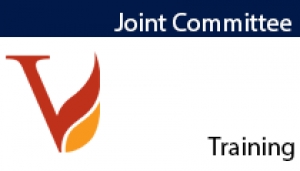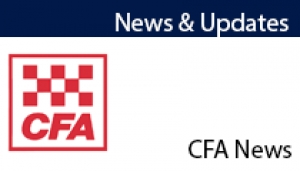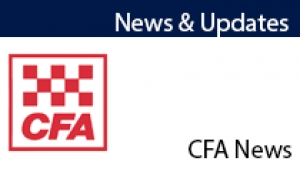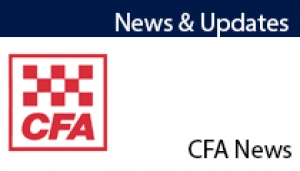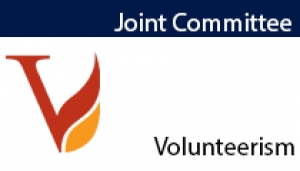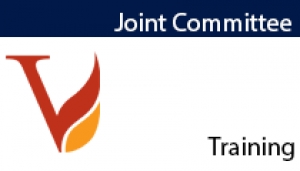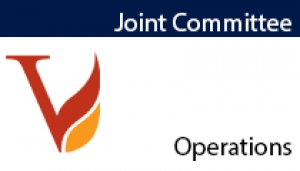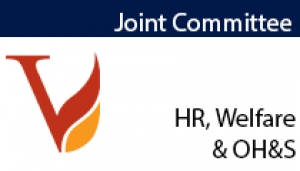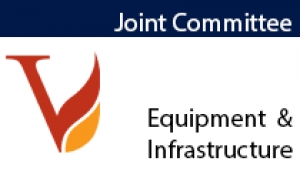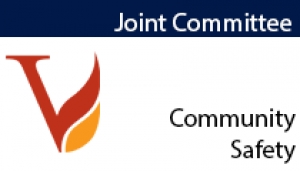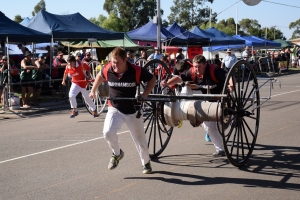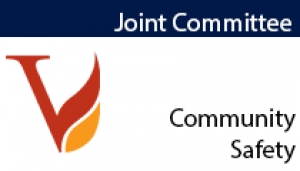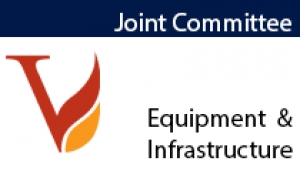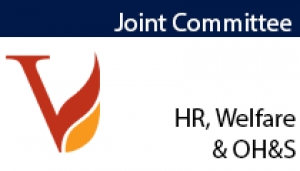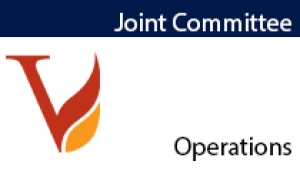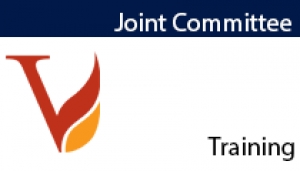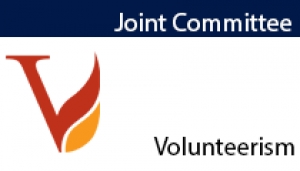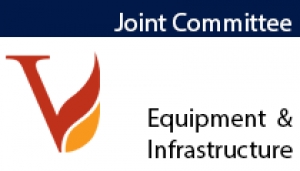Victoria’s Independent Broad-based Anti-corruption Commission (IBAC) has the ability to investigate the conduct of all CFA members; both staff and volunteers.
For more details, see CFA CEO Mick Bourke’s blog at http://news.cfa.vic.gov.au/blog/IBAC-How-it-affects-CFA.html
The VFBV Annual General Meeting included the re-appointment of Board Members Hans van Hamond AFSM, Gary Lyttle AFSM and Tom Brodie AFSM for two years from 1 October 2013.
Mick Nunweek was newly appointed for a two year term as a Board Member, having previously served ex-officio as Vice President Urban.
State Council elected Graeme Jilbert as Vice President Urban and Bruce Vine as Vice President Rural. Whilst the titles cease to exist as a result of constitutional changes at the AGM, State Council confirmed both members as the two State Council nominated ex-officio members of the Board for one year terms, as per the new constitution.
State Council delegates nominated for the Welfare Fund Committee of Management are Ron Cole, Mary Ann Egan, Bill Maltby and Mick Nunweek.
The nine State Council Executive Committee members for the upcoming year from Brigades with predominantly bushfire risk profile are; T Brodie, M Egan, R Cole, B Conboy, K Clough, T Wyatt, R Auchterlonie, M Dumesny, G Neyenhuis.
And the nine State Council Executive Committee members for the upcoming year from Brigades with predominantly structural risk profile are; B Maltby, M Nunweek, P White, R Waterson, C Dennis, B Pickett, T Desmond, P Slender, M Jones.
Following this years AGM, State Council has also awarded VFBV Life Membership to Andy Cusack, Mike Evans, Phillip Lind, Bill Maltby and Col Pomroy, all of whom have given more than 10 years’ outstanding service to the Association.
Volunteers with a Certificate 4 in Training and Assessment (BSZ or TAA) qualifications) will be pleased to hear CFA has declared their qualification to be relevant and of sufficient currency to permit them to continue to deliver training and assessment services when it comes to CFA training.
OTV Executive Director Lex de Man AFSM told the VFBV State Council that his staff had successfully lobbied for the decision as part of a clarification of who can train and assess.
“The decision clears the air so some valuable volunteer trainers and assessors can put their skills to use,” Mr de Man said.
“For CFA training purposes, the BSZ Enterprise Assessor Skill Set is considered equal to the later TAA and TAE Enterprise Assessor skill sets,” he said.
The clarification also deals with situations where volunteers are subject matter experts (SMEs) working under the oversight of a person holding the TAE40110 Certificate IV in Training and Assessment or equivalent.
“For CFA purposes, that oversight can consist of regular guidance, face to face interaction or contact by phone; it does not require the overseer to be present during the training unless it is necessary because of the trainer’s experience or familiarity with the package they are delivering,” Mr de Man
said.
Volunteers with a Certificate 4 in Training and Assessment (BSZ or TAA) qualifications) will be pleased to hear CFA has declared their qualification to be relevant and of sufficient currency to permit them to continue to deliver training and assessment services when it comes to CFA training.
OTV Executive Director Lex de Man AFSM told the VFBV State Council that his staff had successfully lobbied for the decision as part of a clarification of who can train and assess.
“The decision clears the air so some valuable volunteer trainers and assessors can put their skills to use,” Mr de Man said.
“For CFA training purposes, the BSZ Enterprise Assessor Skill Set is considered equal to the later TAA and TAE Enterprise Assessor skill sets,” he said.
The clarification also deals with situations where volunteers are subject matter experts (SMEs) working under the oversight of a person holding the TAE40110 Certificate IV in Training and Assessment or equivalent.
“For CFA purposes, that oversight can consist of regular guidance, face to face interaction or contact by phone; it does not require the overseer to be present during the training unless it is necessary because of the trainer’s experience or familiarity with the package they are delivering,” Mr de Man
said.
Dear CFA volunteer
As our local communities change and often become more diverse, we need to find ways to help Brigades adapt to these changes. This is why the Engaging Diverse Communities Project Team is seeking interest in establishing a CFA Diversity Network.
The network would give interested CFA members:
• A deeper understanding of the issues facing diverse communities
• Practical skills and knowledge needed to engage with diverse communities and
• Help create welcoming environments where diversity is celebrated within Brigades
And of course, this aims to help Brigades and communities become more resilient!
The Aim of This Survey
We know you’re probably sick of surveys but we really hope you’ll take a few minutes to complete this one as we’re keen to take direction from CFA members on where we go with the Diversity Network. Your responses will be kept confidential.
You can access the survey by clicking on this link.
The survey will be open until the end of September 2013 so please take this opportunity to have your voice heard before then.
If you experience problems completing the survey, or have any questions about the Diversity Network, please do not hesitate to contact Debra Salvagno: This email address is being protected from spambots. You need JavaScript enabled to view it.
Thank you for taking the time to complete the survey!
Why be involved in the Network?
By being involved in the Diversity Network you will have an opportunity to focus on this important area of community engagement. The Network will bring members together to share ideas and learn how to actively engage with the diverse members of our community.
The Network will be supported by staff working on the Volunteer Support Program in the Engaging Diverse Communities Project.
By being involved, you can help create and promote an atmosphere in your Brigade that values diversity, and where all members are treated with respect and dignity.
How involved you are is entirely up to you!
The CFA Project Expo is an event for CFA members, their families and the organisation’s major stakeholders. It will showcase more than fifty projects, initiatives, pilots and vehicles.
Where: Whitehorse Club, East Burwood, 298-336 Burwood Highway (close to CFA HQ). Most displays will be inside the main hall with trucks and equipment outside in the carpark..
When: 14 October, 10.30am and 3.30pm
More information: contact Sonia Maclean: This email address is being protected from spambots. You need JavaScript enabled to view it.
• It will be an informal day for our members to get together, have a look at the big picture of what’s going on around CFA, and talk about areas of interest.
• Projects are an important part of the way CFA does business and in particular the way CFA brings about change.
• A program of short presentations and demonstrations (to be held adjacent to the main display area) will be advertised closer to the event.
More than 50 exhibitors will include:
• Specialist Response Vehicles
• Scoresby Hoselayer Project
• Regional Radio Dispatch
• Volunteer Support Project
• Various equipment and PPC
• Member ID Project,
• Volunteer Workforce Management
• Region-based community safety initiatives.
Getting to the Whitehorse Club
By car: turn off Burwood Hwy - ample parking is available at the venue.
By public transport: number 75 tram from the city
By foot from CFA Headquarters: walk through the car park to the rear of Building 8/4 and past the basketball centre.
UPDATE 7 NOVEMBER 2014 - VFBV Cautiously Welcomes Coalition's Cancer Announcement
Click here for VFBV's response
UPDATE 10 OCTOBER 2014 - First Batch of Petitions goes to Parliament
VFBV has lodged the first batch of petitions being collected across Victoria to urge the Government to fix problems with the existing firefighters’ cancer compensation process.
VFBV is hopeful the presentation of these petitions to the Victorian Parliament next week will help convince MPs of all parties to fix a problem that has now been fixed in most other States across Australia.
Over 17,000 signatures are included in this first batch, making this one of the largest petitions to be presented to the current Parliament. In the meantime, the campaign continues and volunteers are urged to keep collecting signatures and posting completed petitions to VFBV, PO Box 453, Mt Waverley 3149.
The first batch of petitions was lodged with the assistance of Labor MP for Narre Warren North, Luke Donnellan, and Liberal MP for Hastings, Neale Burgess.
UPDATE SEPT 22 - SEND IN SIGNED PETITIONS NOW, TO;
VFBV Cancer Petition
PO Box 453
Mt Waverley 3149
And keep collecting signatures to support CFA volunteers with cancer
CLICK HERE to download the 12 page petition
Start collecting today - from friends, family and the community.
Why? Firefighters are more likely to suffer certain types of cancer, but if they become sick, the existing compensation system makes it almost impossible for them to be looked after.
Other States have fixed the problem, but Victoria lags behind.
Help Firefighters to cut through the RED TAPE and make it simpler and fairer to access cancer compensation
CLICK HERE to download the big 50 page petition
HOW TO DO IT;
- The Victorian Parliament requires each signature to have a name and address, and the petition must only be signed on one side of the paper
- When you have a reasonable batch of signed petitions, send them in and keep collecting
- Post them to VFBV, PO Box 453, Mt Waverley 3149 (If you need help with the cost of return postage, call the VFBV office on 03 9886 1141)
- Take the petition everywhere with you
- Organise your Brigade to collect signatures in shopping streets, at community, church or sporting events – wherever large numbers of people are gathering
- We need thousands more signatures by 15 September, so send what you have before then
Want to read more about the issue? Download our;
VFBV’s Notes for Volunteers or
MEDIA RELEASE
Friday 20 September 2013
FIREFIGHTERS’ CANCER LAW ISSUE NOT FINISHED - VOLUNTEERS
A proposal for fairer compensation for Victorian firefighters with cancer has failed in the Victorian Parliament, but the CFA volunteers’ association says the issue is definitely not finished.
Volunteer Fire Brigades Victoria (VFBV) CEO Andrew Ford said CFA volunteers are extremely disappointed and concerned at the way an issue that is so important to them has been treated.
He said the vote in the Upper House of State Parliament this week just raises the question of what the State Government plans to do next.
“Volunteers are seeking a fairer and simpler path to cancer compensation for all Victorian firefighters, and the Government say they are not ruling out this kind of legislation,” Mr Ford said.
“However, Coalition MPs voted against sending the proposed legislation to the Lower House of State Parliament this week, so the legislation has lapsed, which means the ball is now in the Government’s court,” he said.
“The issue won’t go away, volunteer and career firefighters are still more likely to get cancer, current compensation law still forces them to prove a connection between the cancer and a specific date or event, and that is still very close to impossible.”
“How do you prove which fire and which toxins might have caused your cancer when the incident might have been 10 or 15 years ago and just one of the hundreds you have attended?” Mr Ford said.
The legislation had been proposed by the Greens and supported by Labor MPs, it was the vote of Coalition MPs that ended its run in the Upper House on Wednesday.
“Now there is no legislation before Parliament and the State Government has already said it is not ruling out support for this type of legislation, we are in the hands of the Government as to when it will come to Parliament for consideration,” Mr Ford said.
“Volunteers want to know what the Government plans to do now.”
The proposed legislation is presumptive – it would accept that firefighters are more likely to get certain types of cancer and it would presume those cancers to be work-related.
“Presumptive cancer legislation would mean a firefighter with one of those typical firefighter cancers could concentrate on their treatment and recovery instead of a court case.”
In 2011, the Australian Parliament passed presumptive legislation for federally-employed firefighters (including the fire crews at Melbourne Airport) with the support of all of the major parties, after a Senate Inquiry examined the scientific evidence and recommended it go ahead.
Since then, the WA, SA and Tasmanian Governments have accepted the existing scientific evidence and begun work on presumptive legislation for their firefighters.
VFBV and the United Firefighters’ Union are campaigning for presumptive legislation for Victorian firefighters, both volunteer and career.
“We are not asking for any new or extra compensation, just the removal of an unfair barrier to sick firefighters obtaining the compensation to which they are already entitled,” Mr Ford said.
Not long ago, VFBV delegates raised the issue of volunteer dissatisfaction with pre-summer information and post-season debriefing, and we can now report a proposed solution.
CFA has agreed to implement a comprehensive centralised system that will be open to all members that will capture, log, track and report on progress against items raised throughout the season, as opposed to waiting for formal end-of-season reviews.
This should go a long way towards giving volunteers adequate opportunity to raise fireground issues that are still fresh in their minds, whilst providing much needed transparency and a direct line of communication from the grass roots to incident managers.
CFA has extended the feedback deadline on its proposal for a Service Delivery Strategy until 30 September and VFBV is pressing for even more time. VFBV expects that most Brigades will not have had a chance to review this document yet and have raised this as a concern with the CFA Chief Officer.
There's a discussion paper and a survey available on the CFA intranet and Brigades Online (About CFA>Service Delivery>Service Delivery Strategy).
After considering the feedback, CFA plans to draft the strategy, then seek further comment on the draft strategy before finalising it later this year.
The discussion paper considers issues that will influence the decisions in the strategy, including; trends in population, settlement, climate change and extreme weather, volunteerism and technology, and possible directions for CFA and the emergency service sector over the coming decades.
The issues are important to the future of CFA, volunteering and the emergency services. CFA are hoping that many Brigades will read the discussion paper and consider providing input before they begin work on drafting the final strategy.
VFBV will be working with CFA to consider feedback.
UPDATED 13 SEPTEMBER 2013 VFBV affiliation payments for 2013/14 have been received at even higher levels than at the same time last year and indications are that affiliation levels will be even higher for this current year than the previous record set last year.
District 13 already has 100% brigade affiliation and 11 other Districts already have affiliation levels exceeding 90%.
Affiliations are still coming in and Brigades that are still processing the payment or a decision about affiliation are encouraged to finalise this as soon as possible.
Last year 1,198 Brigades and Groups affiliated and we are hoping for even better numbers this year.
By renewing your Brigade or Group membership or signing up as a new member you support VFBV's important work on behalf of all CFA volunteers, your Brigade or Group will be able to participate in VFBV forums and decisions, and you will be eligible to subscribe to the VFBV Welfare Fund.
If you are unsure whether your Brigade is affiliated, contact your Brigade Secretary.
If your Brigade has any queries, call the VFBV office on (03) 9886 1141.
The VFBV/CFA Joint Equipment and Infrastructure Committee reports that all 844 tankers identified for retrofitting with crew protection sprays have now been completed.
Work is now continuing on a further 74 tankers so that the entire tanker fleet is retrofitted with crew protection sprays, bringing to a successful completion what began as quite an ambitious project.
EXTRA COURSE ANNOUNCED - MELBOURNE BASED
APPLICATIONS CLOSE SOON
Courses based at Colac and Inverloch - and now an additional course based in Melbourne.
2014 VFBV Darley Volunteer Leadership Scholarship Program
Forty eight emergency services volunteers have now graduated from the course with the national recognised Certificate IV qualification in Front Line Management that benefits their volunteering, their careers and their communities.
The course is designed to be volunteer-friendly, with a mix of face-to-face class time and off-campus tasks, available in 2014 at Colac, Inverloch and Melbourne.
The course is open to volunteers from CFA, SES, Lifesaving Victoria, St John Ambulance, Australian Volunteer Coast Guard and Ambulance Victoria, and includes units on; Leadership, Decision making, Planning, Safety and risk management, Team effectiveness, Making presentations, Managing projects and Engaging the community.
The course adds to the participants' capabilities in useful skills such as public speaking, business writing and influencing.
It comprises a mixture of lecture style teaching and interactive activities plus a distance learning component designed to suit the needs of adult students.
For more information, click here for the information/application pack.
For the Melbourne-based course, click here for the information/application pack.
Two thirds of the new pagers have been delivered, and VFBV encourages Brigades to ensure they have proper instruction.
Approximately 30% have asked for extra training so far.
If you experience a problem, call the EAS Pager Hotline 1800 604 977 to see if a simple, over-the-air program fix sorts it out.
Log all problems on the Pager Observation Reports to ensure CFA and ESTA can track any issues.
CFA has now opened its Online Career Firefighter Recruitment database, accepting candidates for Career Firefighting positions for start in mid-2014.
CFA advises that they are looking for people who are community-minded and fit, who want a challenging, rewarding and exciting career.
The current list of Career Information Sessions has been fully booked - please watch the CFA webpage for announcements about extra sessions over the next few weeks.
CFA intends to close applications on Friday, 11 October at 4pm.
For more information, visit the Career Firefighter Recruitment area of CFA’s website www.cfa.vic.gov.au
SEE BELOW FOR CFA'S 11 SEPTEMBER MEDIA RELEASE
CFA recruiting career firefighters
CFA is looking for fit, enthusiastic women and men to join the ranks of its 693 career firefighters
who work shoulder to shoulder with the organisation’s 57,000 volunteers.
With growing demands on CFA’s services in Melbourne and large regional centres, more
career firefighters are needed to support volunteers to deliver vital emergency services.
Applications to become a career firefighter have opened at www.cfa.vic.gov.au, with information
sessions to be held around the state in coming weeks.
Successful applicants will begin a 16 week intensive training course in early 2014.
Chief Officer Euan Ferguson said fighting bushfires was just one part of CFA’s role.
“Career firefighters work around the clock alongside volunteers at more than 30 integrated
stations in Melbourne and regional Victoria,” Mr Ferguson said.
“They protect a million homes and businesses from fire and flood, conduct road rescues and
respond to hazardous materials incidents.”
The recruitment drive is part of the Victorian Government’s Project 2016, a response to
recommendations of the Victorian Bushfires Royal Commission.
“In addition to Melbourne, career firefighters are stationed at places such as Geelong, Bendigo,
Ballarat, Warrnambool, Mildura, Shepparton, Wodonga and Traralgon just to name a few.”
“Many people don‘t realise that more than 3.3 million Victorians, including 2 million
Melbournians, come under the protective umbrella of CFA.” Mr Ferguson said.
Over recent years CFA has seen an unprecedented investment in personnel, vehicles and fire
stations, including the recruitment of more than 158 new career firefighters since 2011.
Mr Ferguson said the recruitment drive was also an opportunity to build more diversity into its
ranks, and in particular, increase the number of women career firefighters.
“While CFA is very diverse in some ways, particularly its volunteer base, there is an underrepresentation
of women and people from culturally diverse backgrounds throughout the
organisation,” Mr Ferguson said.
While age is no barrier, applicants will need to meet high standards of fitness, strength and
endurance in addition to the ability to work as part of a strong team in difficult circumstances.
Applicants must also be prepared to relocate to one of CFA’s integrated fire stations across
Victoria. Anyone contemplating a career as a CFA career firefighter can test their suitability at
http://www.cfa.vic.gov.au/volunteer-careers/suitability-test/
.
Volunteerism Joint Committee -2 Minute Briefing
Issue 6, 11 August 2013
Quick snapshot of the priority issues and actions worked through at the most recent Joint Committee meeting between CFA and VFBV. (Meeting held 11/08/2013)
VOLUNTEER SUPPORT PROGRAM (VSP)
An update was given on the Project, there are numerous projects underway with many small group meetings being conducted which have appeared most successful. Project plans have been submitted to the steering committee with project staff working hard on the “discovery” phase to see what types and levels of support volunteers require. By the end of October it is hoped that CFA will begin to form a view of the demonstrated need for permanent resources that will be required after the 1st July 2014 with the ongoing permanent funding.
When first launched by the then Brumby Labor Government the Police & Emergency Services Minister announced that the Volunteer Support Program would fund 64 positions to provide direct support for volunteers. CFA and VFBV are working jointly to deliver on this initiative.
Some of the projects underway at the moment are;
- Membership sustainability,
- Not wanting to look at just Operational needs,
- Mix of membership
- How brigades deal with the issues of declining populations or diversity from which to draw future membership?
- The concept of a CFA Alumni, Investigate volunteer (member) support initiatives that other organisations such as Defence Force, Service Clubs, Forums, and Universities have and are using.
- 1800 help number – as a single information portal for member help/queries;
- CFA shop relaunched by December (State Logistics Centre are willing to participate), there would be a small mark up to ensure costs are covered - not to there to make a profit.
VSP officers have been encouraged to contact VFBV State Councillors or District Council Executive if they have issues of "coming" into the district, also let Kate Harrap know if any issues.
CFA VOLUNTEER STRATEGY - DEVELOPMENT
A working party is to be established, with representation sought from VFBV and any volunteer members willing to participate. This is key body of work for CFA and rated a high priority in Jones Report, has prominence within the Fire Services Commissioner’s Sector wide strategy and is also a key project of the Department of Justice under their Valuing Volunteers Program VSP. VFBV officers and through our Joint Committees are contributing partners in this strategies design and implementation.
As part of the design, CFA will engage other Volunteer organisations (i.e. SES, Surf lifesaving) to ensure complementary programs and themes are developed. Focus will be to embark in one direction with all agencies involved, must also involve VESA with VFBV and any other volunteer representative organisations.
JUNIOR MEMBERS – ID CARDS COMING
CFA ID cards will soon be available to junior members, they will be blue in colour, with the expiry date when they turn 16 years of age. Further information has been asked for to see if the ID card can also have the name of their brigade on it.
NATIONAL EMERGENCY MEDAL (NEM)
CFA has received 3730 approved medal sets from the Australian Honours and Awards Secretariat in Canberra. Another 1,000 nominations are still under consideration. It is likely that the first awards of this batch of medals will commence in September/October this year.
The NEM Working Party has meet numerous times, looking at planning and conducting presentation ceremonies within each District giving recipients and family and friends the opportunity to attend. CFA is planning for presentations to be performed by a Board member, Executive Director, or Regional Director.
Joint Training Committee 2 Minute Briefing
Issue 6, 11 August 2013
Quick snapshot of the priority issues and actions worked through at the most recent Joint Committee meeting between CFA and VFBV. (Meeting held 11/08/2013)
WHO CAN TRAIN & ASSESS – CLARITY BY CHIEF OFFICER & OTV
In an article published in the August edition of the Fireman, the Chief Officer and Lex deMan have issued a clear directive to all members of the Chief Officer’s and CFA’s intent for the delivery of training and assessment to volunteers, particularly a clarification and re-affirmation of the advice to all members contained on the ‘Who Can Train & Assess’ poster distributed widely in 2012. Raised as a question at VFBV’s Open Forum in July, both the Chief and Lex in their Fireman article have made it abundantly clear that there is a clear distinction between Skills Maintenance and Skills Acquisition and that the responsibility for the delivery and conduct of routine and skills maintenance training in Brigades lies with the Captain / OIC. This simply means that any member who has the confidence and endorsement of the Captain/OIC and who holds the competency and experience to do so, can deliver and facilitate training at Brigade level.
Equally in the provision of foundation skills (minimum skills), while acquisition training, where appropriate mentoring is in place, brigades are able to conduct their own training under the approval of the Brigade Captain /OIC. There are specific requirements for the assessment of skills acquisition courses and these rules provide consistent application of training outcomes ie everyone is assessed against a standard and qualifies based on merit. Members should read the August Fireman article for further details.
_____________________________________________________________________
CREATING OUR FUTURE TOGETHER – TRAINING
Recently the Fire and Emergency Management (F&EM) Strategy was approved. CFA aims to unify the
operating model and the way we work to ensure the most effective and efficient service delivery is
established and achieved.
Guiding Principles The following principles guiding CFA training are designed to assist with standardisation across the state;
- Empower brigades, groups and districts by giving them ownership of their own learning through
increasing volunteer and staff capacity to deliver and assess training.
- F&EM at a district level will be responsible for determining the training and planning needs within a
district (includes brigades, groups, and catchments).
- OT&V at a district/ region level will be responsible for the coordination and delivery of training to
brigades, groups and catchments.
- OT&V at a state level will be accountable for the provision of training services to districts and
provision of standardised systems and application of frameworks, procedures and processes across
the state.
- Further develop the use of technology in the design and delivery of training.
- Ensure we have training infrastructure that is accessible to all both mobile and fixed.
- Greater focus on the development and monitoring of our training management systems to ensure
quality and standardisation of outcomes.
- Develop operational support capacity within the OT&V Structure.
Proposed changes OT&V are proposing:
- To refresh the OT&V service delivery model, taking into consideration member feedback and comments provided.
- CFA’s aim is to implement this throughout 2014 and have a consistent and standardised approach in every district for the planning and delivery of training and assessment.
- To operate CFA service delivery across regions and districts.
- A training services function that would be based regionally and work with operational leaders at a regional level.
- To create the role of Senior Instructor to work across districts.
- To centralise some aspects of current business (for example: first aid bookings, data entry and regional training finance).
- To have greater connectivity to FE&M service delivery, with Operations determining the training needs and OT&V delivering to their specifications.
Members are encouraged to discuss the directions for Training and the impact of the proposed changes.
Joint Operations Committee 2 Minute Briefing
Issue 6, 11 August 2013
Quick snapshot of the priority issues and actions worked through at the most recent Joint Committee meeting between CFA and VFBV. (Meeting held 11/08/2013)
2012/13 FIRE DANGER PERIOD OPERATIONAL REVIEW
Delegates have persistently been critical of the 2012/13 Operational review process that was used during this year’s post season reviews, with many reports of volunteers not knowing about, or having access to last season’s debrief process, resulting in a very top heavy and disjointed review and action planning. The Joint Committee has made a major breakthrough, with CFA agreeing to implement a comprehensive centralized system that will be open to all CFA members that will aim to capture, log, track and report on progress against items raised throughout the season, as opposed to waiting until the end of the season for formal reviews.
-
A local referral process is being built into the process to ensure issues have the opportunity to be resolved at the lowest appropriate level before being escalated. This should go a long way towards providing volunteers with an adequate opportunity to raise issues of concern experienced on operational deployments & on the fire ground while it is fresh on their minds, whilst also providing much needed transparency and line of sight from the grass roots to incident managers during post season reviews. Regular reporting back to the Joint Committee of issues being raised will also provide the opportunity for the committee to spot trends and common themes. It is hoped that this new process will ultimately provide much needed evidence to influence future joint agency reform agenda’s to ensure systemic issues being raised by volunteers are given adequate attention. Further details of the system will be provided by CFA after initial testing is complete, and the committee commends CFA on progressing this much anticipated initiative.
VOLUNTEER UTILIZATION ON SPECIALIST APPLIANCES
The committee went through a preliminary report on the number of volunteers who are trained and qualified to use the various range of specialist appliances within the fleet. The reports have overwhelmingly confirmed our view that volunteers are experiencing difficulty gaining access to the training necessary to operate these appliances and are often overlooked in their response and operation. The committee is now progressing work on a report that will be submitted to the Chief Officer to make him aware of the problem and our concerns, and recommend a suite of treatments that will not only look at increasing volunteer access to training on these appliances, but will also look at increasing the opportunities for volunteers to actually use those skills once they have them. The vehicles being included in the review are Technical Rescue (including rope and trench), Teleboom’s, Bronto Aerial Ladders, and Aerial Pumpers. The review will also look at the general up skilling of volunteers at Integrated brigade locations in order to assess adequate access to training for Heavy Hazmats, Heavy Pumpers and other vehicles to ensure response plans are holistic and use all available resources available within brigades.
REVERSE SECTION 29’s
The Committee is progressing work on introducing a new component to Brigade Section 29’s which will allow brigades to report on the level of support provided by CFA and what support they think is needed to meet their requirements. Section 29’s have historically been used as a mechanism to report on brigade preparedness and efficiency, but has lacked the ability for the brigade to assess and report on whether they are getting the support or resources from CFA that they actually require to meet those targets and objectives. The revised Section 29 will be piloted in two Districts this year, with the intent to seek the Chief Officers endorsement for state wide roll-out during the 2014/15 financial year.
HR, Welfare and OH&S Joint Committee 2 Minute Briefing
Issue 6, 11 August 2013
Quick snapshot of the priority issues and actions worked through at the most recent Joint Committee meeting between CFA and VFBV. (Meeting held 11/08/2013)
CREATING OUR FUTURE TOGETHER
The committee discussed the Creating our Future Together project. Feedback regarding the recent round of presentations included:
- Timeframe is not sufficient for consideration of proposal. It is difficult to align feedback timelines with Group meeting schedules, some groups only meet once every 2 months..
- There have been concerns raised that Ops people might be put under additional pressure with the structure.
- Implementation of the helpdesk concept will be critical to its success. A helpdesk might delay or duplicate issues if not implemented well. There need to be clarity about what the issues that go to the helpdesk. Need to make sure Districts are not left out of the loop with queries going to a help desk.
- Proposed model will need to incorporate support required during fire season.
- Need to move decision making authority to the districts consistent with mission command principles.
CFA’s LEADERSHIP FRAMEWORK
Draft Leadership Framework was tabled for feedback. To date feedback has been positive with discussions including the role of situational leadership and the need to be adaptable as leaders. Committee members saw the value in integrating the framework into processes including succession and development. Discussion included the concept of Leaders at All Levels and the group identified key areas to integrate the framework into including Forums, skills maintenance and mentoring and coaching programs. There was acknowledgement that “Leadership” has been raised in many areas ie Jones Report/Royal Commission etc. Feedback included:
- Strong agreement that it needs to reflect CFA member’s views and not be just a theoretical model.
- Need to embed this in how we work - a person appointed to the role may not be the role they always perform, eg: a Brigade Captain or Group Officer could be a crew member on a strike team during a major incident. Leadership roles vary and are contextual. Good leaders need to be able to be led by others in certain situations
- Delegations need to align to situational leadership.
- People need to be able to step in & out of leadership.
- Developing leaders for the future as a focus.
OHS&E RESOURCES CONFIRMED AND ONGOING
CFA have advised that additional ongoing OHS&E positions have been approved for the deployment of dedicated OHS&E specialists across the CFA network. These much anticipated roles have been supported in some of the most difficult financial management times, yet these appointments are testament to the importance that Occupational Health, Safety and Environment must play in any organisation, including CFA.
VFBV was notifed of CFA’s decision recently and welcome the investment in dedicated resources to work with all members, much of the role requiring field presence and interaction. VFBV’s District Council networks will have specific interest in developing stong working relationships with these OHS&E personnel and look to integrate their own District and Council safety and environment work into the strong state network this initiative will offer.
Equipment & Infrastructure Committee 2 Minute Briefing
Issue 6, 10 August 2013
Quick snapshot of the priority issues and actions worked through at the most recent Joint Committee meeting between CFA and VFBV. (Meeting held 10/08/2013)
RED PLATES PROGRESS
CFA have advised that the Department of Treasury and Finance and have now approved CFA’s request for an exemption of Stamp Duty for the transferring of brigade owned vehicles to Red Plates. This is a major milestone, and we are now only awaiting advice from VicRoads as to the request for a waiving of road worthy inspections that technically would be required during the changeover of plates. CFA has requested an exemption from the road worthy inspection pointing out that the change of plates is simply an administrative process, and not a change of vehicle ownership, and are also requesting that the new plates be sent to CFA in bulk and allow the fitting to be done through CFA’s local DMO workshops. These were two areas identified by the Joint Committee has having a major impact on volunteers, and the delegates are extremely grateful to CFA for pursuing both initiatives.
MEDIUM PUMPER PROTOTYPE
CFA have approved funding for a new Medium Pumper Prototype to be built during 13/14 which will be used to showcase recent developments being considered for the next generation Medium Pumpers. A state-wide roadshow is envisaged similar to that done with the Medium Tankers last year; that saw unprecedented volunteer involvement and feedback on the new designs. The Medium Pumper Working Party is progressing well on draft design and specifications, including a major review into the cab chassis, and the small gear that will be supplied as minimum stowage. A communications plan is being developed to begin introducing some of the proposed changes to members ahead of an eventual prototype, and the committee commended CFA on the high level of technical support & collaboration that has been provided by CFA officers to the Working Party to date. The support and assistance has been outstanding.
AERIAL PUMPER PROGRESS
The State training package for the new Aerial Pumpers, is now complete, and delivery of two of the four new appliances is now underway. A renewed focus to ensure volunteers at the four integrated brigades receiving these new appliances are both trained and utilised has now been agreed, with an affirmative action plan being developed for each location to ensure volunteers have equal access to the training and skills development required to operate them.
SAND TANKER PROGRESS
The Committee is reviewing evaluation of the Heavy Tanker prototype that has been fitted with an automated tyre inflation kit, for future use as a “sand tanker”. Under consideration also are modifications to the cab chassis that may provide greater opportunity to add more water - a frequent request by brigades who have to operate in sandy/desert environments. Options being considered are single/day bed cab chassis vs sleeper/twin cab configurations. There are pro’s and con’s to each, and the Working Party is currently evaluating the different designs. CFA has approved funding for a Sand Tanker prototype to be developed during the 13/14 production run.
Community Safety Advisory Committee 2 Minute Briefing
Issue 6, 11 August 2013
Quick snapshot of the priority issues and actions worked through at the most recent Joint Committee meeting between CFA and VFBV. (Meeting held 11/08/2013)
PLANNED BURNING PERMITS
Interim results from the recent Planned Burning Survey undertaken by Brigades, continues to highlight the frustration Brigades are experiencing with overly prescriptive permit conditions. The Committee has initiated a review in conjunction with the Vegetation Management Program team to review the wording and language used on CFA’s permit template that is issued to brigades for approved planned burns. Feedback suggests the guidelines stipulated in the permits are being interpreted by many brigades as conditions that must be strictly adhered to, rather than their intended use as guidelines. It is hoped by changing the language on the permits, refining the instructions, and promoting what levels of flexibility are considered compliant within the permit conditions, and will go a long way towards removing the long held perception that the permit conditions are unattainable.
COMMUNITY ENGAGEMENT & FIRE AWARENESS STATE FORUM
This year’s State Forum held in the first week of August at Bendigo, was a resounding success, with 300 members from across all 20 CFA Districts, representing 160 brigades across the State attending. Feedback from attendees was overwhelmingly positive, with the majority of respondents marking the forum as Very Good to Excellent. Congratulations to the Member Engagement Team and the volunteer organising committee for a job well done. Thank-you also to all members who attended the forum and shared their stories on what initiatives brigades have implemented to engage with their communities.
COMMUNITY SAFETY PUBLICATION PORTAL LAUNCHED
The committee was very pleased to learn that the requested Publication Portal has now been launched on the CFA website. The portal provides brigades and members of the public with access to over 40 publications and fact sheets that are produced by CFA in one easy to find place. Brigades can now see what publications are available, with a picture of the front page of each to assist with easy identification, and a link to an electronic version of the document. Audio copies of publications are also available for download. Brigades can use the portal to see what publications are available, and can receive printed copies by contacting their local District office. Brigades are urged to refer to the portal when planning for any local community events, and order copies well beforehand to ensure you have the most up to date literature available. The portal can be accessed at; http://www.cfa.vic.gov.au/about/publications/
APPAREL OPTIONS
CFA has agreed to progress a review of what apparel options are available for members wishing to be involved in community education. Committee members have been advocating the need to provide volunteers and staff with suitable options that are flexible enough to allow for local variations, but would still present a professional image to the community. The aim is to provide affordable and flexible apparel options to any member who wishes to wear it, and provide volunteers access to any corporate apparel currently available to ensure clothing is not used as a subliminal wedge between paid members delivering community education and local volunteers.
Communications & Technology Joint Committee -2 Minute Briefing
Issue 6, 11 August 2013
Quick snapshot of the priority issues and actions worked through at the most recent Joint Committee meeting between CFA and VFBV. (Meeting held 11/08/2013)
EAS PAGER REPLACEMENT PROGRAM UPDATE
Amy Ford from ESTA spoke to committee members on the pager roll outs that have been done for CFA, SES and AV. Approximately 2/3 of pagers have been distributed, there have been a number of questions on functionality of the pagers rather than faults.
Approximately 30% of brigades have asked for extra training, as there was never an intention of a "drop and run" without any training. ESTA and CFA will provide training as required to any member who requires this, brigades are encouraged to do this as a group and contact the EAS help desk. ESTA encourages that any issues to be reported to the Brigade’s District Office or the EAS help desk. There are four support ESTA staff to assist with support for pagers. Need members to be comfortable to use the device, so please ask for support for further training.
ESTA are also after as much feedback to see if there are any faults, with planning for field trip to visit District to gather feedback. This method was deemed more effective that doing a survey.
The Quick Reference User Guide information sheet that was distributed with the new pagers will also be sent as a poster to brigades.
EAS Help desk phone 1800 604 977
ESTA USER REFERENCE GROUP
At the request of VFBV, an EAS Pager User Reference Group will be established towards the end of the year to deal with a number of issues including; future pagers designs, the ongoing improvement of this new pager with programming and firmware upgrades and management and overview of issues and fault rectification with this new pager. This group will also look at lessons learned from this pager roll out and what needs to be done with the end user in mind. The group will be made up of volunteers and staff from all agencies.
LISTENING SETS
There have been two business cases put forward to CFA (one for streaming on the internet and one for a separate radio device). VFBV is of a view that there is a need to have a range of solutions to cater for the situational awareness needs of all CFA members. VFBV is awaiting the approval of the business cases and advice on how the solutions will be funded.
In anticipation of a ‘device styled solution’ CFA will soon call for expressions of interest from suppliers for digital listening sets (looking to have these fully programmed and possibly distributed from the manufacturer).
Following the decision to progress a suite of solutions, CFA will call for tenders from IT vendors for the live streaming and hardware supply.
OBSERVATION REPORTS
Information has been requested from the committee as to the details regarding progressing solutions as a result form brigades lodging paging and communications observation reports. This is due to advice to VFBV that there is rarely any follow up to the brigade once the observation report is lodged.
CFA Officers have advised that the time frame for observation reports is Brigades are required to have them submitted within 60 days of the reported issue/incident and ESTA must have them completed within 60 days from their receiving them. Our Committee delegates sought to see how a decision was made in the follow up and ensure that this is done on each occasion. The committee has also requested to see a summary of the observation reports tabled at each meeting.
MEDIA RELEASE
Wednesday 21 August 2013
CFA VOLUNTEERS NOT IMPRESSED BY CANCER ANNOUNCEMENT
The CFA volunteers’ association is unimpressed by the announcement of a new body to deal with compensation claims from firefighters suffering from cancer.
Volunteer Fire Brigades Victoria (VFBV) CEO Andrew Ford said the State Government’s proposed Firefighters’ Assessment Panel does not solve the problem.
"We need new legislation to fix this - firefighters are still more likely to get cancer because of their exposure to smoke and chemicals, and it is still almost impossible for them to prove it was work related because of the nature of the work they do," Mr Ford said.
"Too often they get a legal battle when what they really need is the chance to concentrate on their treatment and recovery," he said.
"It’s even possible the proposed Firefighters’ Assessment Panel will be just another bureaucratic barrier - it is being sold as a way to better support the processing of claims, but we are worried it could just be an even bigger barrier to firefighters getting the compensation to which they are entitled."
VFBV wants presumptive legislation; current Victorian compensation arrangements already provide for cancer compensation, but it is almost impossible to access because the firefighter has to prove the cancer was caused by one particular fire or incident that might have happened 10 or 15 years ago.
The proposed presumptive legislation would work by reversing the onus of proof – the firefighter’s cancer would be presumed to be work related provided the firefighter has sufficient years of service. A firefighter’s claim could still be rejected if it could be proven that the cancer was not related to firefighting duties.
Presumption allows the firefighter to concentrate on treatment and recovery, not a lengthy and expensive battle to prove the cause of their cancer.
"Firefighters are already entitled to compensation for work related cancer, but cancer is not like a broken leg – it’s almost impossible to prove the cancer came from one particular fire that might have been 10 years ago," Mr Ford said.
The Australian Government already has presumptive cancer legislation for federally-employed firefighters, and the West Australian, South Australian and Tasmanian Governments are all introducing similar laws.
"Other Governments in Australia and overseas have already accepted the scientific proof that firefighting leads to a higher risk of certain types of cancer," Mr Ford said.
"Here in Victoria there have been questions from the Government about the cost, and media reports of estimates in the millions – we doubt those estimates are accurate, but if they are, then those millions are just the measure of the cost being paid by firefighters and their families when they become ill, because there’s an unfair barrier to the compensation to which they are entitled," he said.
"CFA volunteers and their career colleagues are not asking for something new or extra, just the removal of that unfair barrier," he said.
Ends…
UPDATED - the Bendigo workshop has been cancelled - the clash with Melbourne Cup weekend was preventing many participants from attending
Volunteers in the Bendigo area should consider the workshop at Ballarat - see below for dates for Traralgon, Ballarat and Dandenong
The workshops include Junior events this year.
The workshops are facilitated by experienced Competitors/Coaches, and all urban competition brigades are encouraged to attend.
Current or prospective competitors and coaches will gain an insight into the techniques of successful competitors and teams, which will not only lead to better competition but safer competition.
You are encouraged to take advantage of the facilitators’ experience and skill, support their willingness to assist you, and attend a Workshop.
This year Junior events are being incorporated into the program of each Workshop for the benefit of Junior Coaches and competitors.
There is no limit on numbers attending, but please advise VFBV office of numbers attending for catering purposes; ph 9886 1141 or This email address is being protected from spambots. You need JavaScript enabled to view it.
Workshop dates & venues are:
- Traralgon track, Saturday 8th November 2014
- Ballarat track, Sunday 16th November 2014
- Dandenong track, Saturday 22nd November 2014
See below to download the flier with full details of each workshop.
Volunteers will be aware that VFBV is campaigning for presumptive legislation – the firefighters’ cancer law – to provide a fairer and simpler path to compensation for volunteer and career firefighters who contract typical firefighter cancers.
As the issue progresses, there have been claims and assumptions made about the number of potential claimants and the possible cost to government, including a reported government estimate of $130 million in annual costs to CFA.
VFBV strongly doubts that estimate, especially since there appears to be little reliable information about potential claims in Victoria, and a Senate Inquiry has already heard that other countries did not experience a rush of new claims when they introduced presumptive legislation for their firefighters.
How you can help
If you, or a volunteer that you know, have made a cancer-related claim for compensation, or suffered from cancer and believe it was related to service to the community as a firefighter, we would like to hear from you.
Please contact VFBV Project Officer Peter Beaton on 0419 504 111 or at This email address is being protected from spambots. You need JavaScript enabled to view it.
Update: 12 August 2013 - This update will assist VFBV delegates in having this discussion with local MPs and encouraging discussion amongst our broader volunteer network.
Sadly, Victoria is still lagging behind other states on presumptive legislation to provide a fairer and simpler path to compensation for volunteer and career firefighters who contract cancer.
The Victorian Government has indicated it is awaiting the results of new Monash University research, when even the researchers have indicated the wait is unnecessary (see below for what they had to say).
In the meantime, you may have seen a recent media report that Government estimates obtained in a Freedom of Information (FOI) application suggest an annual claims cost to CFA of $130 million if the legislation is passed.
VFBV finds that figure difficult to believe, given that evidence accepted by a Senate inquiry considering the federal legislation showed there has not been a rush of claims when overseas governments passed similar laws.
Whether you believe those estimated figures or not, fair protection for firefighters shouldn't be made impossibly hard just to save the Government money.
If the cost really is that high it is because the problem is real and the cost is being borne by sick firefighters and their families. If that is the case, then it is not reasonable to leave them facing that cost if they contract cancer while protecting community.
Progress in other states
Tasmania: The Tasmanian Labor Government has introduced draft legislation into Parliament, although the Bill is, in our opinion, quite flawed in that it requires arbitrary numbers of turnouts before a firefighter can qualify for coverage. The Bill is set to come up in the Tasmanian Lower House in August and expected to pass with the support of Labor and the Greens – the Liberals have not yet stated their position. The process may be more complicated in the Tasmanian Upper House, which has a significant number of independent MPs. See the Tasmanian Government’s announcement here.
South Australia: Having initially refused to support a Bill introduced by the Greens on the basis that it was awaiting the results of new research by Monash University, the SA Labor Government has now introduced its own Bill. The SA Government’s Bill excludes volunteers, with the SA Government saying it is awaiting additional scientific studies before considering them. You can download the SA Government’s media release below.
Western Australia: The West Australian Liberal National Government has announced it will introduce presumptive legislation to cover volunteer and career firefighters, based on the Federal Government legislation as is being sought by VFBV, and verbally advised WA volunteer representatives that it will apply from 1 July 2013. See the WA Government’s announcement here.
Victoria lags behind
It is disappointing that the Victorian Government has not yet declared its support, even though draft legislation has been presented to our Upper House by the Greens, with the in-principle support of Labor.
The Victorian Government has indicated it is awaiting the result of new Monash University research, even though the Australian Senate has already accepted a considerable weight of overseas research, the Australian Parliament passed legislation in 2011 with the support of all of the major parties, and even the Monash University researchers say sufficient evidence already exists.
In a letter to the Greens, researchers Associate Professor Deborah Glass and Professor Malcolm Sim said;
“…there is already good evidence from a very large number of previous human studies that work as a firefighter is associated with an increased risk of several types cancer… …waiting for more research findings, especially in this situation where the results of many cancer studies in firefighters are already available, will lead to unacceptable delays, possibly extending into years. “
In the meantime, the Victorian draft legislation will return to the Upper House of Parliament on Wednesday 21 August 2013, with no guarantee it can proceed. From a VFBV viewpoint the issue shouldn’t be delayed, no matter the outcome on 21 August. If the Bill can be introduced in the Upper House then volunteers will be looking to the other political parties to support it – if the Bill can only be introduced in the Lower House, then it is up to the major parties to either introduce or support presumptive legislation there.
VFBV has worked to secure the support of all of the major parties for this important initiative, reflecting the all-party support the Federal legislation received in the Australian Parliament in 2011.
VFBV and the United Firefighters’ Union are running a joint campaign for presumptive cancer legislation to apply to all Victorian volunteer and career firefighters. This issue is fundamental for all firefighters.
What you can do
We call on VFBV delegates across Victoria to contact their local MPs and ask for their active support for presumptive legislation to make the path to cancer compensation simpler and fairer for all Victorian firefighters. We are asking all Victorian MPs to take up the issue – those who don’t support presumptive legislation should be able to tell you why they do not.
If an MP does not support presumptive legislation, VFBV delegates should ask for their feedback on the issue. VFBV will inform our membership of the progress on this issue, including making a summary of feedback from MPs available on the VFBV website.
VFBV has prepared a detailed briefing that local delegates can hand to MPs when meeting with them.
VFBV is also working to inform the Premier, Minister and other key MPs, publicising the issue via the media, writing to all State MPs and keeping volunteers informed via our website, the VFBV newsletter, The Fireman and regular updates to VFBV State Councillors and District officials.
The next appearance in the Victorian Parliament
Volunteers can attend State Parliament on the afternoon of Wednesday, 21 August 2013, to hear the debate when the Greens’ proposed Bill returns to the Upper House during the afternoon. VFBV is not organising an official event, but any presence of volunteers in the public gallery will emphasise the importance of the Bill.
VFBV invites expressions of interest from volunteers who are either involved or have an interest in taking up the Fire Behaviour Analyst (FBAN) role within Incident Management Teams (IMTs).
The invitation is part of the CFA IMTTP (Incident Management Team Training Project) and is open until 30 August 2013.
For those that do not know much about it, a Fire Behaviour Analyst is a technical specialist role. It involves the consideration of science and experience to analyse risk and communicate the results to help emergency managers make decisions. It is a relatively new role in Victoria. Formal training for the role began in 2007. Development and uptake of the role was initially rapid, but the need for further role clarification and coordination has been identified. A project is underway to develop a multi-agency Bushfire Predictive Services Strategy. The strategy will clarify how fire agencies should best use Fire Behaviour Analysts and their ability to apply science and modelling to make incident predictions. The Bushfire Predictive Services Strategy will deal primarily with the Fire Behaviour Analyst program. It will provide a model that could be adapted for other hazards and technical expertise, for example flood prediction.
The FBAN role and Bushfire Predictive Services Strategy probably won’t interest or affect many members, but, like many technical or specialist roles, for the right person it could be a great opportunity for them to use their unique knowledge and experience to improve emergency management in Victoria. The group developing the strategy is keen to tap in to the diversity and depth of knowledge that exists amongst volunteers across the state. They are trying to develop a strategy based on what end users prefer. Our challenge is finding the right person or right people to provide feedback. If we find the right people to help, and they develop a good strategy, we will end up with better support for bushfire management. Improving the way we integrate bushfire science will make our operations more efficient, more effective and safer.
As a guide, the right people to help with the strategy development would probably:
• Have had contact with the existing fire behaviour analyst program or have had involvement with similar work (eg flood specialists)
• Be interested in and knowledgeable about bushfire scientific research or predictive modelling
• Be interested in weather forecasting
The best people to help with this strategy may not be immediately obvious. They may have a prominent incident management role (eg Planning Officers or Incident Controllers), or have come across fire science and predictive modelling another way. For those interested helping, there are two lengthy documents providing background details that have informed the strategy development to date and a discussion paper with targeted questions.
The strategy will be drafted soon, so VFBV is trying to identify interested people as quickly as possible. If you know of someone suitable who would like to be involved, please provide their names, brief outline of their interest and/or experience, and contact details to VFBV Executive Officer Adam Barnett by end of August 2013 (but the sooner the better). As EOIs come in, Adam will make contact with each person to discuss what opportunities exist for them to be involved.
Contact:
Adam Barnett
Executive Officer, VFBV
Volunteer Fire Brigades Victoria
P: (03) 9886 1141 M: 0403 711 911
E: This email address is being protected from spambots. You need JavaScript enabled to view it.
UPDATED 27 September: The VFBV Annual General Meeting has voted unanimously to adopt proposed changes that remove urban and rural brigade distinctions from the association’s constitution.
The voting on 11 proposals followed extensive consultation with District Councils - see below to download the discussion paper that preceded the vote.
The changes include;
- An addition to VFBV’s Statement of Purpose; ‘To maintain and pursue a balanced focus on issues affecting CFA volunteers across all brigades from all risk profiles.’
- Abolishing the titles of Vice President Rural and Vice President Urban, replacing those positions with two State Council ex-officio Board Members elected by State Council each year
- Changing the titles of the VFBV President and Vice President to State President and State Vice President, to end any potential confusion with the titles of District Council officials
- Replacing the State Council Urban and Rural subcommittees with special purpose committees
You can download a copy of the VFBV Constitution, amended 15 September 2013, here.
Issue 5, 19 May 2013
Quick snapshot of the priority issues and actions worked through at the most recent Joint Committee meeting between CFA and VFBV.
EAS PAGER REPLACEMENT PROGRAM UPDATE
The VFBV Board advises all members that the pager validation trial has confirmed that the Alpha Legend pager has met the test described by the five programming upgrades sought by volunteers. Despite some reservations there is insufficient reason for volunteers to refuse to participate in the pager changeover program. Accordingly, the VFBV Board recommends that volunteers accept the new pager and return the old pager, as part of the roll-out program.
ESTA’s presented details of the EAS network upgrade and key features of the new EAS Alpha Legend Pager.
- Small message font size was raised as a potential issue by CFA and other agencies. ESTA’s investigations found that there is little flexibility in changing the font size due to the small size of the pager screen.
- ESTA has received feedback from VFBV on information/order of information to be provided in messages. Waiting feedback from CFA.
- SOP for the message template has been sent to VFBV for feedback and input from CFA.
ESTA demonstrated a new prototype cradle designed to house the pager. The cradle picks up sensors from the pager upon activation and creates a loud audio alert signal and flashing light for up to three minutes. The cradle is portable and can be used in vehicles via a cigarette lighter plug in. Literature has been sent to agencies and is also being distributed at pager rollout.
Time has been set to present the cradle to F&EM. Potential use and purchase of the cradle will be subject to CFA policy yet to be raised.
REGIONAL RADIO DISPATCH PROJECT (RRDS) UPDATE
Business Change Manager will be recruited. Anticipated to be an F&EM type role similar to Operations Manager role on the RRP project.
Working with Telstra to finalise the District rollout schedule. Final schedule will be available at the end of May. It has been agreed that Districts 12, 15 and 2 will be completed first.
- Timing of outer metro switch to digital network
- Provision for expansion of the regional digital network has been made in the current RRDS contract.
- Outer metro digital network will flow on from completion of regional rollout, dependent upon funding.
Vehicle location distress function is a separate project to RDS and will be delivered at some time after districts migrate to the digital network (timing to be advised by Tait).
- 1. DIGITAL MIGRATION
Working on finalisation of the Digital Migration Strategy document. The final document will be provided to all stakeholders for review. Planning phase will commence upon completion of the strategy, commencing with the RDS regional plan.
- 2. LISTENING SETS
Work on two solutions:
- Radio scanner for analogue and P25 digital
- ‘Streamed’ audio
Allocation priorities (critical listeners) and commercial model are to be identified. Source of funding to be identified. Digital scanner solution must be in place by end October to align with the first RDS rollouts.
Issue 5, 19 May 2013
Quick snapshot of the priority issues and actions worked through at the most recent Joint Committee meeting between CFA and VFBV. (Meeting held 19/05/2013)
PLANNED BURNING SURVEY 2013
Continuing on from our last 2 Minute Briefing the Committee has suggested refinements to the content of the survey which will canvas the attitudes towards, experiences with and brigade expectations of planned burning.
Many brigades already use planned burning as excellent training and skills maintenance activities, and recognise that participating in planned burning contributes significantly to our understanding of fire behaviour and tactics. And yet brigades do not have the ability to track, report or recognise their members’ involvement through a CFA centralized system.
Recognising there are significant limitations on how much planned burning volunteers can do and that planned burning is a high risk activity requiring trained and experienced fire fighters and resources, the survey asks questions about brigade participation, past, present and future. The survey explores possible future brigade capacity to be more involved in planned burning operations, and the support volunteers would require, and allows members to indicate the barriers to brigade participation they see such as volunteer availability, access to training, skills maintenance opportunities, and equipment and resourcing requirements.
CFA is under increasing pressure to be more involved with planned burning, so it is vital that members assist with identifying any barriers or frustrations that prevent volunteers from being more involved. Your feedback to this survey will shape future CFA & Government policy.
RESIDENTIAL FIRE SAFETY CAMPAIGN 2013
Facts: More people die in Victoria each year from house fires – than they do from bushfires. Most fatal fires occur in the home! They can be prevented. One third of all residential fires occur in the kitchen. Under the CFA Act, Brigades are not only required to respond to these fires when they occur, but also to assist their community prevent these kind of fires in the first place.
The Home Fire Safety Campaign is a joint MFB/CFA campaign and it acknowledges the fact that house fires happen all year round. The campaign will commence in late May and will feature high profile chef ambassadors attracting the media and spreading the message about understanding fire risks in the home.
Delegates were briefed in the campaign details and are working with CFA to ensure the message reaches local and regional communities as well as metropolitan Melbourne.
VEGETATION MANAGEMENT
In addition to the Planned Burning Survey, the committee has requested CFA perform a review of its Vegetation Management Program to better understand the successes of the program as well as any barriers preventing VMO’s from assisting brigades with their needs. Brigades will be asked to contribute specific examples of vegetation management issues to the review as well as their feedback regarding their involvement with Vegetation Management Officers since the program commenced in 2010.
Issue 5, 19 May 2013
Quick snapshot of the priority issues and actions worked through at the most recent Joint Committee meeting between CFA and VFBV.
SPECIALIST VEHICLE INSPECTION
The committee held its May meeting, at CFA’s commissioning factory in Dandenong South. New appliances are housed at this factory whilst they await operational approval, equipment fit out, ergonomic assessments and the development of training materials.
The committee inspected the new Technical Rescue pods, Heavy Hazmat, new Forward Operations Vehicle, Aerial Pumpers and the 2 new Mobile Communication Buses.
The delegates provided CFA with feedback on each vehicle, but were equally impressed with the stowage and ergonomic work that has taken place that will rank these vehicles very highly in safety and manual handling.
The committee is seeking to ensure there are no barriers to volunteer use or training on any of these vehicles, and to ensure their placement is both strategic and risk based.
CREW PROTECTION
All 844 tankers that were originally identified for the crew protection retrofit sprays have now been completed. Work is now continuing on a further 74 tankers that were not originally identified, that will see the entire Tanker fleet now fitted with crew protection sprays bringing to a close a highly successful and ambitious project to roll this protection out across the fleet.
RED PLATING
State Council has endorsed the committee’s recommendations that were submitted to CFA that will see all brigades provided the opportunity to red plate their brigade owned vehicles, and have their registrations managed and renewed through a centralized system. CFA is now in talks with the Department of Treasury and Finance and VicRoads with regards to the offsetting of stamp duty and vehicle transfer fees. The committee continues to work with CFA to assist with the design of a changeover strategy that will see DMO’s used to manage the changeover, alleviating the needs for brigades to have to visit a VicRoads office. Work continues to progress.
2013/14 PRODUCTION PLANNING
CFA reported to the last meeting that no additional government funding had been provided for the planned 2013/14 production run. Historically, only one third of the yearly vehicle production budget comes from CFA base funding, with the remainder normally being sourced by intergovernmental (BERC) bid funding. CFA has advised its BERC bids for the 2013/14 production run was unsuccessful.
If no further funding will be provided, this will have major implications on the fleet age and profile. At present CFA would have to build 110 new vehicles per year, just to maintain a maximum age of 20 years. At present, CFA are already still running 21 Tankers built in 1986 tankers – making them the oldest in the fleet. They will be 27 years old this year.
VFBV has written to CFA seeking confirmation of their bid to government, and the VFBV Board will consider further action upon receipt of confirmation.
Issue 5, 19May 2013
Quick snapshot of the priority issues and actions worked through at the most recent Joint Committee meeting between CFA and VFBV.
VOLUNTEER SUPPORT PACKAGE – WELLBEING STREAM
CFA outline a plan to work within the Volunteer Support Package to develop a Wellbeing Stream, a suite of services and support to volunteers over and above those that currently exist. CFA and VFBV delegates discussed the range of current programs and services available to members and some further options were workshopped to inform the project team of likely avenues for research in terms of designing and building strong wellbeing support services and products.
As part of the discussion the future viability of the current CFA Equal Opportunity Officer network was considered. CFA are indicating that many comparable organisations are dismantling their EO networks, VFBV having a contrary view that albeit not perfect, the EO Officer network is today a product of a lack of support and emphasis by CFA. Some concerns that CIS Peers are being asked to pick up the pieces and work in support of members where Equity and Diversity, bullying and harassment matters are concerned. VFBV is keen to progress the work within the Volunteer Support Package. A refocused and energised network of trained and capable advisors that can support BMT’s and volunteers on matters of wellbeing, relationship management and conflict management is seen as highly desirable as an outcome of this work,. VFBV has offered names of experienced volunteers to act in a reference Group role to assist with the analysis and future directions of this research and program development.
OHS&E OFFICERS
CFA advised the VFBV delegates that CFA has approved the ongoing provisioning for Occupational Health, Safety and Environment Officers to be in place, post the looming 30 June 2013 deadline for the previous OH&S Project Officers funding expiration. VFBV delegates indicated strong support for the ongoing appointment of Field OHS&E Officers and welcome CFA’s decision.
It is understood that 6 personnel will be field based and assigned to provide coverage across Victoria. A Coordinator role plus additional roles designed for Field training Grounds, Environmental and potentially DMO facilities may ultimately exist. VFBV delegates expressed their strong support for these roles to be fully integrated into CFA’s OHS&E networks, with particular emphasis on the development and support to HSE representatives in all brigades and Groups.
YELLINGBO REHAB UNIT ON SHOW
On show for all CFA and VFBV Joint Committee delegates at CFA Headquarters during the lunchbreak was Yellingbo brigades new support vehicle. Yellingbo Fire Brigade is leading the way to reduce member’s injuries and illnesses when they respond to emergencies. The brigade has built a specialist support vehicle that carries equipment for its specialist role of rehabilitation of fire fighters at long duration incidents, especially where the new structural firefighting clothing is worn in conjunction with breathing apparatus equipment.
Heat related illness occurs when the body’s core temperature rises above normality. A core temperature above 39c is considered dangerous. Symptoms of heat related illness include heat rashes, cramps, headaches, vomiting, exhaustion and left untreated, in severe cases, could even lead to death. To combat this and to lessen the chance of heat related illnesses, specialist appliances like YELLINGBO'S SUPPORT VEHICLE with REHAB MODULE will carry specialist cooling chairs that would be utilised, by providing forearm submersion, to assist in bringing a firefighters core body temperature down. It also carries marquees to provide shade and protect against the elements, a large amount of bottled water and electrolyte satchels to mix with the water to assist in hydration of the firefighters, hot and cold washing facilities, fans, small first aid kits and ration packs.
YELLINGBO SUPPORT with REHAB MODULE is now available for active rehabilitation of firefighters on the fire ground. Call for YELLINGBO SUPPORT through VICFIRE.
Issue 5, 19 May 2013
Quick snapshot of the priority issues and actions worked through at the most recent Joint Committee meeting between CFA and VFBV.
2012/13 SUMMER CAMPAIGN DEBRIEFS
Members would remember from our March update that the Delegates to the CFA/VFBV Joint Operations committee had requested CFA to actively plan, support and engage with volunteers as part of this year’s debrief process, in order to provide sufficient opportunity for feedback and comment on any issues encountered during this seasons summer campaign fires, and to ensure issues relating to volunteer utilization, support, welfare and optimisation are not overlooked in any multi-agency, whole of sector debrief process.
Disappointingly, the committee is receiving reports from Districts that this has not occurred, and there has been little or no ability for volunteers to participate in some parts of the State. A report of the CFA planned sessions submitted to the committee at their May meeting, reported 12 CFA facilitated debriefs scheduled across the state, all occurring on a weekday during normal business hours. The committee have written to the Chief Officer, and DCO responsible with its concerns, and requesting a full list of all debriefs held, and a renewed effort for a more inclusive process to encourage feedback from grass root levels.
If you don’t believe you have been given the opportunity to participate in a formal debrief, and you would have liked to, please report your concern to your local State Councillor, so that we can track concerns District by District.
40km Speed Limits
Delegates have provided CFA with notice that they intend to re-open discussions on introducing a 40km speed limit when passing a stationary emergency service vehicle displaying its red and blue lights. The committee with CFA’s endorsement, last tried to progress this issue in early 2009, and was thwarted by Victoria Police, who believed it would be too difficult to enforce. The South Australian parliament recently introduced changes to their laws (they have had a 40km speed limit for a number of years now) to require motorists to slow to 25km when passing stationary emergency vehicles. Whilst not wishing to pursue the 25km speed, delegates believe the 40km speed limit continues to be an important issue to ensure the safety of our members when working beside roads and highways. Road workers are routinely protected by reduced speed limits, yet our members are not currently afforded the same protections.
SOLAR PANEL SIGNAGE
State Council has referred an item raised from District 17 concerning the signage requirements for solar panel installations. The concern raised is that the signage is inadequate, deteriorates within 6 months, or is often not there at all. State Council has requested the committee investigate with the office of the electrical inspector to determine if the current laws are sufficient, or whether stronger penalties or enforcement are required. The committee will report its finding back to State Council at their September meeting.
OTHER ITEMS BEING PROGRESSED
The Committee continues to progress work on; Jones Implementation Progress, volunteer utilization in IMT’s, CFA Capstone, review of CFA Regulations & Role of Group.
Issue 5, 19 May 2013
Quick snapshot of the priority issues and actions worked through at the most recent Joint Committee meeting between CFA and VFBV.
INCIDENT MANAGEMENT TEAM TRAINING PROJECT – IMTTP
The IMTT Project continues to progress the development of 14 common training packages that will be adopted sector wide. The outcomes are to prepare IMT personnel with common training pathways and will require standardised training packages, assessments, qualifications and endorsements irrespective off agency and not differentiating between paid or volunteer.
A number of pilots are in the process of being conducted with most recently a pilot for Warnings and Advice Officers. VFBV sought and received assurances that all future pilots at all levels will be conducted in both weekday and weekend format options to permit volunteer participation.
As the IMTTP is multi agency focussed, the Heads of Agencies Panel that endorses the training, assessment, qualification and endorsement processes has agreed to a Skills Maintenance / Accreditation period of 5 years with elements of currency of skills and experiences included in the requirements. VFBV delegates expressed some concerns that such a defined timeline may disadvantage volunteers who have much less opportunity to perform roles based on seasonal activity fluctuations. Exercising and scenario testing along with opportunities for involvement in fuel reduction activities may provide volunteers with adequate opportunity to exercise their skills outside of emergency response situations. VICPOL is responsible under the Fire Services Commissioner’s strategy for Exercising and drafts are being prepared to establish regular scenario and exercise regimes.
A Sector Commander pilot course that was conducted has seen the need to re-model the program with the plan to conduct a further Multi Agency pilot course in the second half of 2013.
____________________________________________________________________________
BOSP REVIEW
CFA is undertaking a review of the Brigade Operational Skills Profile (BOSP) tool with a view to matching the elements of the profile to Brigade Classifications. VFBV delegates expressed their concerns that the current BOSP tool is applied as a ‘Maximum Model’, defined in isolation and with no consultation with brigades as to the operational requirements or specific needs of brigades.
VFBV delegates indicated that the setting of arbitrary limits for particular qualifications or skills as a ‘desirable target’ is reasonable, however, the field practice of judging a brigades performance or capability by the application of generic number limits reviewed at annual Section 29 Inspection is flawed and can unreasonably hamper or restrict a Brigade Management Team’s ability to plan and deliver skills acquisition to their responder members. VFBV delegates indicated that feedback from many Regions across the State indicate that brigades with notional numbers on or above their BOSP limit are resulting in training applications for some courses being refused on the basis of ‘you already have enough’. VFBV delegates cautioned CFA to reflect on the risk that in many cases without the ability to translate some older members who hold the competencies but may be less active to what was once known as ‘Reserve listing’, the churn of newer members who have a desire to attain new competencies may be stifled if BOSP numbers continue to limit volunteer training opportunities.
INCREASED UTILISATION OF VOLUNTEERS AS TRAINERS & ASSESSORS
VFBV delegates have brought reports to CFA of a wide inconsistency in the utilisation of volunteer trainers and assessors from across the State, particularly in the authorisations provided to volunteers to conduct training and assessment in a wide range of core and foundation skills and competencies. CFA have advised that they are requesting a comprehensive report from each Region of the approved trainers and assessors and the units/elements of competencies that they are approved to deliver and assess. VFBV delegates have expressed their support for a more transparent and consistent approach that delivers an organisational consistency in the future.
Issue 5, 19 May 2013
Quick snapshot of the priority issues and actions worked through at the most recent Joint Committee meeting between CFA and VFBV.
VOLUNTEER SUPPORT PACKAGE (VSP)
The recently formed VSP Management Team were in attendance with the members introducing themselves to the Joint Committee members. Kate Harrap gave overview of the Project Team structure and responsibilities. Additional new project staff will commence on 3rd June and a comprehensive induction process in being planned of which VFBV will be involved. OT&V will be ensuring there is the right governance and reporting tools to complement the work and outcomes for the project.
VSP Project funding is available up to 30th June 2014, where ongoing funding after this will be dedicated to ongoing volunteer support resources being imbedded in CFA business as usual. The Project Team and the Program Steering Committee will oversee the outcomes of this next phase with a view to making recommendations for ongoing practical support for volunteers being embedded in CFA arrangements and actions.
For the initial phase of the project there be a strong field focus, visiting a variety of Brigades and Regions and other CFA work locations to enable the team to have the best understanding of CFA. VFBV has been involved in these processes.
REGIONAL INITATIVES
There are many Region / District initiatives such as Ex-Captain's forums, Legends Dinners, Moomba activities, Ash Wednesday Memorial Service, OH&S, LMR peer engagement. CFA want to encourage the good work of Brigades / Groups, Districts & Regions in what they are doing to ensure they continue and also share the ideas and experiences of such good initiatives.
EXIT SURVEY PILOT & RECRUITMENT PILOT
Peter Sharman, Graham Cocks and Brian West are part of the Working Group for the Exit Survey pilot.
There will be a 3 month trial beginning soon to test the tools required for CFA to conduct exit interviews (using a variety of mediums). The trail will involve interviewing those that may have left in last 6 months and using some of the tools already developed. From this, the Working Group will see what worked and what didn't to ensure that CFA understand why people leave the organisation and how best to deal with it.
Once the trial is complete and adjustments made CFA may undertake a quarterly report of those that have left the organisation and send out the exit surveys at these times. The tools developed can also be provided to the Captain / Secretary of brigades.
NATIONAL VOLUNTEER WEEK 2014
There is a proposal to conduct a torchlight procession to coincide with National Volunteer Week and CFA’s 70th Anniversary in Melbourne in 2014.
As such feedback is required from members to see if they will support this, please indicate to your State Councillors if your brigade would participate before June 22nd this year.
5 August 2013
After discussions with VFBV, CFA is now applying for an exemption from stamp duty and roadworthiness inspection so that Brigade Owned Vehicles can be transferred to red government number plates without any extra cost.
The move is designed to solve a number of problems associated with having the truck registered to the Brigade, including having to name a member as their Brigade Nominee, responsible for the registration and any traffic fines.
In December 2011, VFBV formed a working group through the Joint Equipment and Infrastructure Committee and requested that CFA take immediate steps to remove the personal liability from the volunteers. The working party asked that CFA seek legislative change if that was necessary to fix the issue.
In late 2012, as a result of strong lobbying by VFBV and recent examples of vehicles having been found not to be registered, or individual volunteers having lost their licences due to infringement notices that were posted to old addresses – the item progressed to the CFA Board who supported immediate steps be taken to investigate VFBV’s proposed solutions including the option for brigades to red-plate Brigade Owned Vehicles.
This would see BOVs being fitted with government red plates, and CFA being listed as the “Registered Operator” and the Brigade listed as the “Registered Owner.” This would remove the need for the Brigade to provide an individual nominee, as all infringement and registration issues would go directly to CFA, and be dealt with in the same manner as they are with CFA owned vehicles. Importantly, the Brigade would continue to be the legal owner of the vehicle when it comes time to sell it or trade it in.
CFA originally sought to make it mandatory for all BOVs to be red plated, and that the registration fees be automatically recovered from Brigades by deducting it from their annual Brigade allowances, but CFA has now agreed with VFBV’s proposal that Brigades should have the right to opt-out of the proposal.
The opt-out proposal would, for example, suit Brigades with personalized number plates that have historic or symbolic importance to the Brigade or community. The opt-out model would ensure the economies of scale that CFA sees as the main benefit would still be retained, but would allow any dissenting Brigades the opportunity to continue to operate under the existing arrangements.
Changes to CFA
Limited time for volunteers to comment
STORY UPDATED 6 AUGUST:
Under the name of Creating our Future Together, CFA is proposing significant changes to the way the Regions work and CFA supports Brigades.
CFA is calling for feedback and has now extended the deadline for comment on the proposals to Friday, 30 August, after VFBV expressed concern that volunteers were not being given sufficient time to hear about the changes and consider them.
The proposed changes include;
- Reorganising Districts in to five Regions instead of the current eight
- New Assistant Chief Officers in the roles of Regional Director/Regional Commander
- Changes to the roles of Brigades, Groups, Districts and Regions
- Changes to the way Brigades are supported
- Allocation of resources by workload, not location
CFA says the changes are intended to improve support to Brigades and members, reduce red tape and enable better service delivery.
Please familiarise yourself with the proposals, help spread the word among your fellow volunteers and provide any comments by Friday, 30 August. See below for links to CFA’s information.
If you have any concerns or comments, please raise them through the methods made available by CFA, talk to your State Councillors, call the VFBV office or email This email address is being protected from spambots. You need JavaScript enabled to view it.
The CFA CEO explains the proposals under Creating our Future Together in his blog, here.
VFBV is conducting phone interviews with volunteers
15 to 20 minutes of your time
Help us to reach the individual volunteer
The Jones Inquiry into the Effects of the Arrangements made by CFA on its Volunteers made a recommendation that VFBV consider amending its constitution to enable individual volunteers to be members of our association.
With Department of Justice support under the Valuing Volunteers Program, VFBV has begun to explore priorities and activities to increase our connection with the volunteer as an individual and better meet the future expectations of volunteers. This project will report to the VFBV board with some opportunities for us to embrace into the future.
As part of this project we are conducting informal telephone interviews with CFA volunteers from across the state. It doesn’t matter if you hold a position in your Brigade, are a VFBV delegate or an ordinary Brigade member, we want to speak to anyone who has ideas on how VFBV can increase our engagement with our members.
If you are interested in being part of this project please contact the Project Officer, Kara Bishop, by AUGUST 1ST on 9886 1141 or email This email address is being protected from spambots. You need JavaScript enabled to view it. to arrange a suitable interview time.
The VFBV Annual General Meeting will be held on Sunday 15 September at Fiskville, starting at 1pm.
All CFA Brigades and Groups and VFBV District Councils are invited to attend.
Lunch is available from noon - for catering purposes please book in with the VFBV office by Friday 30 August 2013. Call (03) 9886 1141.
The VFBV Annual General Meeting will be held on Sunday 15 September at Fiskville, starting at 1pm.
All CFA Brigades and Groups and VFBV District Councils are invited to attend.
Lunch is available from noon - for catering purposes please book in with the VFBV office by Friday 30 August 2013. Call (03) 9886 1141.
 About
About 
